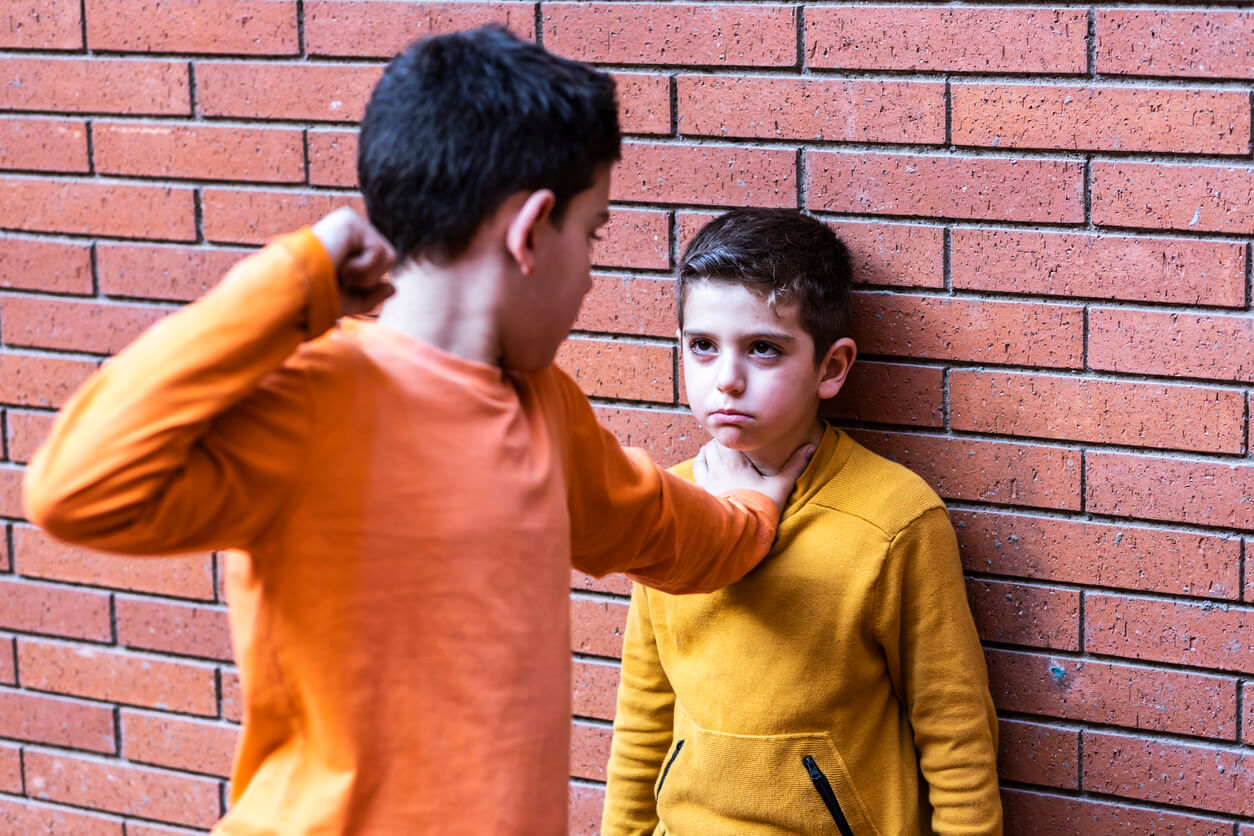Behavioral Problems in Children: When to Seek Professional Help


Written and verified by the psychologist Mara Amor López
Behavioral problems in children are a concern for all parents. However, all children have times when they misbehave and interrupt, don’t obey rules, or have tantrums. The issue is that these behaviors become more problematic and serious. This may indicate that this is a major problem and that you need professional help.
Seeking help from a mental health specialist doesn’t mean that the child is crazy or has a mental illness. Nor does it mean that we’re bad parents. Sometimes, for a variety of reasons, extra support is needed to help us perform more successfully in disciplining our children. It’s important in these cases to intervene as early as possible to ensure success.
In this article, we’ll discuss when it’s necessary to seek professional help for behavioral problems in children.
Behavioral problems in children: Warning signs
Surely, as parents, we’ve all wondered if a certain behavior is problematic or if it’s normal child behavior. There are many reasons why you should seek the help of a specialist. But there are certain signs that would indicate that we should get information and assistance from a professional for the child’s behavior. Some of these are outlined below.
The child’s behaviors hinder the normal development of the class at school
If a child is frequently taken out of class because of behavioral problems, doesn’t do homework, disturbs the rest of their classmates, or won’t stop talking, among others, it’s likely that they need professional help. The goal is to address these behaviors and receive guidance regarding their discipline.
Our discipline isn’t working
If our discipline techniques aren’t working, a mental health professional can guide us to find out where we’re failing and what discipline alternatives we can apply.

The child’s behavior isn’t appropriate for their age
If your child is 8 years old and still has frequent tantrums; or at 10 years old hits other people, these behaviors aren’t appropriate for their age and developmental level. Therefore, if you observe immature attitudes compared to those of children of the same age, it’s important to seek professional help.
Your child’s behaviors affect their social life
Children need to have positive social interactions with other children. If their behaviors hinder or make it difficult for them to make or keep friends, it’s very important that you seek the help of a specialist.
Warning signs to seek immediate professional help
As you’ve seen, there are behavioral problems that may require the guidance of a professional but aren’t serious behaviors. Still, there are others that we can’t ignore, so we should seek professional help immediately. Let’s look at some of the warning signs:
- Self-injury: Banging their head against tables, walls, or other objects, cutting parts of their body, or abusing harmful substances.
- Cruelty to animals: The child enjoys tormenting or hurting pets or other animals.
- Aggressive behaviors: Threatens, breaks things, hurts others, gets involved in fights, or participates in aggressive or destructive actions, among others.
- Frequent truancy: Frequently misses school and doesn’t go to school regularly.
- Lack of empathy or remorse: They care very little about other people’s feelings.
- Criminal behavior: The child steals from stores or houses, sets fire to different objects, and enters other people’s houses or the school to cause damage, among others.
- Extreme non-compliance with rules: Refuses to follow rules or norms, lies about the actions they carry out, and runs away, among others.
- Evidence of hallucinations: Hears or sees things that others can’t hear or observe.
- Sexualized behaviors: Makes depictions of sexual behaviors or sexualized comments.
- No intention to change their behaviors: Refuses to change their bad behaviors even though they have constant consequences. In addition, they’re not affected by your insistence that they change.

Seek professional help when there are behavior problems in children
Behavior problems in children can be very difficult to deal with and need a thorough assessment by a professional. That way, you can rule out that there’s a mental health problem behind such behaviors. These behaviors may be due to ADHD, anxiety disorder, oppositional defiant disorder, or depression, among others.
For this reason, it’s so important that we seek the help of a professional to act as soon as possible and thus put a solution to these problems. There’s no one better than a specialist to guide us and treat your child so they can get better.
Behavioral problems in children are a concern for all parents. However, all children have times when they misbehave and interrupt, don’t obey rules, or have tantrums. The issue is that these behaviors become more problematic and serious. This may indicate that this is a major problem and that you need professional help.
Seeking help from a mental health specialist doesn’t mean that the child is crazy or has a mental illness. Nor does it mean that we’re bad parents. Sometimes, for a variety of reasons, extra support is needed to help us perform more successfully in disciplining our children. It’s important in these cases to intervene as early as possible to ensure success.
In this article, we’ll discuss when it’s necessary to seek professional help for behavioral problems in children.
Behavioral problems in children: Warning signs
Surely, as parents, we’ve all wondered if a certain behavior is problematic or if it’s normal child behavior. There are many reasons why you should seek the help of a specialist. But there are certain signs that would indicate that we should get information and assistance from a professional for the child’s behavior. Some of these are outlined below.
The child’s behaviors hinder the normal development of the class at school
If a child is frequently taken out of class because of behavioral problems, doesn’t do homework, disturbs the rest of their classmates, or won’t stop talking, among others, it’s likely that they need professional help. The goal is to address these behaviors and receive guidance regarding their discipline.
Our discipline isn’t working
If our discipline techniques aren’t working, a mental health professional can guide us to find out where we’re failing and what discipline alternatives we can apply.

The child’s behavior isn’t appropriate for their age
If your child is 8 years old and still has frequent tantrums; or at 10 years old hits other people, these behaviors aren’t appropriate for their age and developmental level. Therefore, if you observe immature attitudes compared to those of children of the same age, it’s important to seek professional help.
Your child’s behaviors affect their social life
Children need to have positive social interactions with other children. If their behaviors hinder or make it difficult for them to make or keep friends, it’s very important that you seek the help of a specialist.
Warning signs to seek immediate professional help
As you’ve seen, there are behavioral problems that may require the guidance of a professional but aren’t serious behaviors. Still, there are others that we can’t ignore, so we should seek professional help immediately. Let’s look at some of the warning signs:
- Self-injury: Banging their head against tables, walls, or other objects, cutting parts of their body, or abusing harmful substances.
- Cruelty to animals: The child enjoys tormenting or hurting pets or other animals.
- Aggressive behaviors: Threatens, breaks things, hurts others, gets involved in fights, or participates in aggressive or destructive actions, among others.
- Frequent truancy: Frequently misses school and doesn’t go to school regularly.
- Lack of empathy or remorse: They care very little about other people’s feelings.
- Criminal behavior: The child steals from stores or houses, sets fire to different objects, and enters other people’s houses or the school to cause damage, among others.
- Extreme non-compliance with rules: Refuses to follow rules or norms, lies about the actions they carry out, and runs away, among others.
- Evidence of hallucinations: Hears or sees things that others can’t hear or observe.
- Sexualized behaviors: Makes depictions of sexual behaviors or sexualized comments.
- No intention to change their behaviors: Refuses to change their bad behaviors even though they have constant consequences. In addition, they’re not affected by your insistence that they change.

Seek professional help when there are behavior problems in children
Behavior problems in children can be very difficult to deal with and need a thorough assessment by a professional. That way, you can rule out that there’s a mental health problem behind such behaviors. These behaviors may be due to ADHD, anxiety disorder, oppositional defiant disorder, or depression, among others.
For this reason, it’s so important that we seek the help of a professional to act as soon as possible and thus put a solution to these problems. There’s no one better than a specialist to guide us and treat your child so they can get better.
All cited sources were thoroughly reviewed by our team to ensure their quality, reliability, currency, and validity. The bibliography of this article was considered reliable and of academic or scientific accuracy.
- Martin, M. Á. L. (2014). Cómo intervenir en los problemas de conducta infantiles. Padres y Maestros/Journal of Parents and Teachers, (356), 37-44.
-
Trenas, A. F. R., Osuna, M. J. P., & Cabrera, J. H. (2012). La interacción entre padres e hijos y su relación con los problemas de conducta externalizante. Análisis y modificación de conducta, 38(157-158).
-
Pacho, Z. R., & Triñanes, E. R. (2011). Programas de entrenamiento para padres de niños con problemas de conducta: una revisión de su eficacia. Anales de Psicología/Annals of Psychology, 27(1), 86-101.
-
Foster, S. L., Brennan, P., Biglan, A., Wang, L., & al-Gaith, S. (2006). Prevención de problemas de conducta: lo que sí funciona. CENEVAL.
This text is provided for informational purposes only and does not replace consultation with a professional. If in doubt, consult your specialist.








